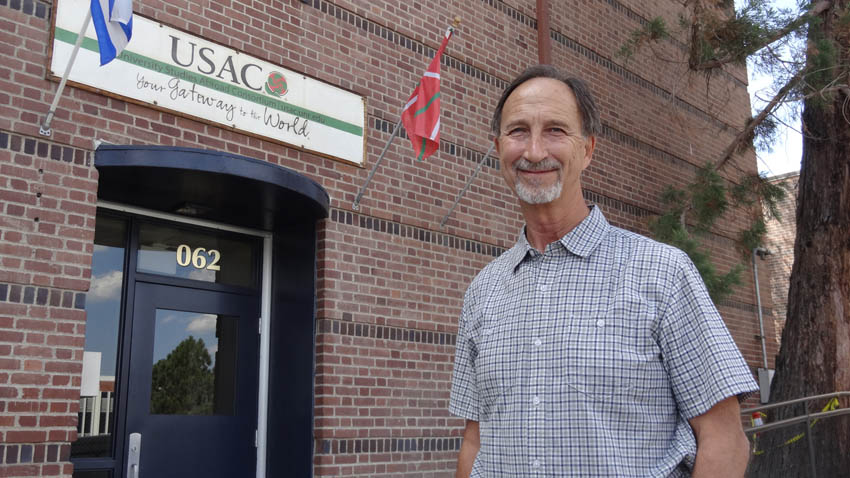Carmelo Urza has dedicated his entire life to providing American students the possibility of studying abroad. With an undergraduate degree from Boise and a Ph.D. in Spanish, he has directed USAC, based in Reno, for more than thirty years.
basque heritage worldwide

12/23/2015

ADVERTISING
Carmelo Urza has dedicated his entire life to providing American students the possibility of studying abroad. With an undergraduate degree from Boise and a Ph.D. in Spanish, he has directed USAC, based in Reno, for more than thirty years.
Joseba Etxarri. Son of a Basque sheepherder who immigrated to Idaho at the end of the 40s, Carmelo Urza has been part of the nucleus in Reno for more than 40 years at the crossroads of such institutions as the Center for Basque Studies, the Basque Library as well as USAC that he directs. He came to Reno from Boise in 1973 and in 1974, traveled to Oñati, with the first program, led by Pat Bieter that brought Basque-American students to the Basque Country that would be the germ of the University Studies Abroad Consortium (USAC).
How many students do you currently have all over the world?
Annually there are a little more than 4,000 students that study with us in 44 centers that we have in 26 countries.
Introduce USAC to us.
It is a consortium of universities that provide students with the opportunity to carry out a part of their studies abroad, convalidating their credits in their respective universities. It began with two universities, Boise State University and the University of Nevada. Today there are more than 33 universities in the US, with agreements with another 48 universities around the world. Our students are mainly American, but we also have had students from other parts of the world from universities that we have agreements with, many times, as an exchange. We are one of the five largest organizations of this kind in the United States.
One entity that links the Diaspora to the Basque Country.
We came, indeed, to maintain a permanent program in the Basque Country. We started in September of 1983 with our first group of 22 or 23 students in Donostia. Over the years, we have calculated that we have sent nearly 8,000 students to the Basque Country; between 300 and 400 annually. In the beginning, most were of Basque origin but today, as is the norm with these numbers, only some of them still are. But it is interesting, for example, a Japanese student that we had spent a year in Donostia and acquired a notable level of Euskara that he later continued to cultivate.
What is the profile of one of your students?
In general they are around 21 years of age, and in their third or fourth year. Between 66 and 67% are girls, which is the norm in our sector. They study a variety of majors: business, psychology, languages….In Euskadi we have programs in Bilbao and Donostia on the University of the Basque Country campus, with whom we have a great relationship. The students have the possibility of taking a variety of classes like Basque or Spanish, or art, sociology, anthropology, history, business…the majority stay for a semester, nearly 15% for a year, and the rest participate in summer courses that run from five to 10 weeks.
When they choose Bilbao or Donostia do they know that they are in the Basque Country or they think they go 'to Spain'?
We have two more programs on the Iberian Peninsula, in Madrid and Alicante, and the student that chooses the Basque Country does so because he/she wants to. Word of mouth works very well and many of our students take the advice of their friends, family members or others who have already participated in a USAC program. We also have brochures, catalogs and websites that describe each destination very well.
USAC, and yourself have a very special relationship with Donostia.
I’m sure you are saying that because the city awarded me the Urrezko Danborra (Golden drums) in 1995. I was very grateful, knowing that it was being awarded to USAC and myself as its head. What is sure is that we have and have had a wonderful team that has worked there, and was led for many years by Felix Menchacatorre. We are very proud of them, our work and what the experience of living abroad does for our students. Often when I wear my USAC t-shirt and I run into people who say, ‘I studied with you,’ or ‘what a wonderful experience, unforgettable,’ they tell you all about their phenomenal experience in the Basque Country. USAC has crown immensely, and has a large international presence, but our roots and our reason for being are without a doubt in Euskadi. We are very grateful to the Basque Country, its people and its university.
I didn’t want to end this conversation without commenting on the review that appeared in the New York Times in August about a novel by a Basque-American author…
Yes (smile). It was the first novel by Gabriel Urza…that just happens to be my son. The book is called All That Followed and is situated in the Basque Country. Gabriel is a lawyer and he parked and sacrificed his career as an attorney for his literary vocation, and now it seems that it is bearing its first fruits. The novel has been very well received. It just occurred to me that he was also in the Basque Country with USAC. Maybe that has also influenced the theme and atmosphere of the book. He has worked hard and his family, and everyone who knows him are delighted that he is now being recognized.
ADVERTISING
ADVERTISING
ADVERTISING
ADVERTISING
ADVERTISING
© 2014 - 2019 Basque Heritage Elkartea
Bera Bera 73
20009 Donostia / San Sebastián
Tel: (+34) 943 316170
Email: info@euskalkultura.eus